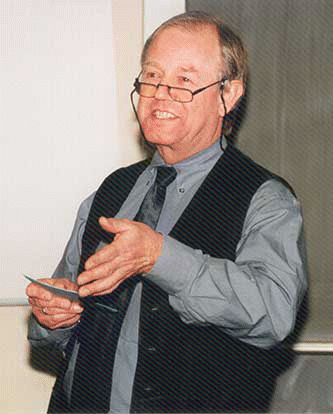Wolfgang Höll (1944–2010)
 Wolfgang Höll was born on 4 April 1944 in Ettlingen, Germany and died on 11 May 2010. He had only just retired from his position at the University of Karlsruhe and was still immensely active and busily engaged in collaborations with his many international colleagues. He was diagnosed with acute leukaemia in January 2010 and was gradually recovering from a course of intense treatment when he had a sudden relapse and sadly passed away.
Wolfgang Höll was born on 4 April 1944 in Ettlingen, Germany and died on 11 May 2010. He had only just retired from his position at the University of Karlsruhe and was still immensely active and busily engaged in collaborations with his many international colleagues. He was diagnosed with acute leukaemia in January 2010 and was gradually recovering from a course of intense treatment when he had a sudden relapse and sadly passed away.
Wolfgang studied chemical engineering at the Univer sity of Karlsruhe and graduated as Dipl-Ing in 1971. He obtained his Dr-Ing in 1976 under the supervision of Professor H. Sontheimer and became Dr-Ing habil in 1985. Professor Dr-Ing habil Wolfgang Höll worked for his entire career at the Karlsruhe Research Centre, in the former Institute for Technical Chemistry, Section for Water Chemistry and Geochemistry, rising from Research Group Head to Acting Director of the Institute. He also taught chemical engineering over many years at the University of Karlsruhe.
His principle research interests were adsorption, ion exchange, and soil/groundwater remediation. His research activity was vast and covered an impressive range of frontiers projects, in particular the use of carbon dioxide for regeneration of weak acid ion exchangers, development of non-polluting ion exchange processes for partial demineralization of water based on the use of carbonic acid for regeneration, development of processes for the removal of trace heavy metals and other inorganic trace contaminants from waste water and from drinking water supplies, research on the performance of heavy metal complexes in ion exchange columns for separation of mixtures, separation of mixtures of heavy metals by means of Parametric Pumping, elimination of heavy metals from waste water by means of novel precipitation systems, modelling of sorption processes for multispecies ion exchange equilibria based on the surface complexation theory, elimination of organic compounds from water by adsorption onto activated carbon, development of adsorbents and sorption processes using sorbents from organic waste materials, removal of heavy metals from contaminated solids (soil, sediments, rubbish material), and application of novel magnetic separation processes for the removal of hazardous heavy metals from waste water.
Wolfgang forged many international collaborations during his career that are far too numerous to mention in detail. He enjoyed a long and fruitful scientific cooperation with colleagues in Russia as well as teams of researchers in China, Taiwan, Brazil, Turkey, Romania, Australia, and New Zealand. His love of travelling and working with students was his hallmark. Wolfgang was an inspirational leader who emanated a relaxed and comfortable disposition, either when he was teaching or advising his contemporaries and/or students. He had a special relationship with his PhD students treating them as research partners and helping them not only in academic matters but advising and supporting them in their personal lives.
In his spare time, Wolfgang had several interests and hobbies. From early childhood he had a fascination with steam trains that undoubtedly encouraged an interest in all things mechanical. He also had a serious interest in large ships, mainly battleships and was able to recite their technical details from memory with amazing skill. He was an accomplished sportsman with an affection for soccer but most of all he loved swimming. He collected several swimming trophies in his younger years and never failed to find the beach on his many trips abroad so that he could take a dip in the sea. He was a very accomplished pianist and loved to play for his own personal enjoyment and sometimes entertained his colleagues during the social time at meetings and conferences. His casual competent manner brought him so many friends and admirers in countries across the world.
His eminence and esteem in the field of adsorption and ion exchange technology was recognised by the Society of Chemical Industry in London by a special award in 2004 from the Separation Science and Technology Group. He is greatly mourned and is sadly missed by all his friends, colleagues, former students, and everyone who benefited so much from his expertise and generous kindly manner.
Professor Michael Streat FREng FIChemE
Emeritus Professor of Chemical Engineering, Loughborough University
Visiting Professor, Imperial College London